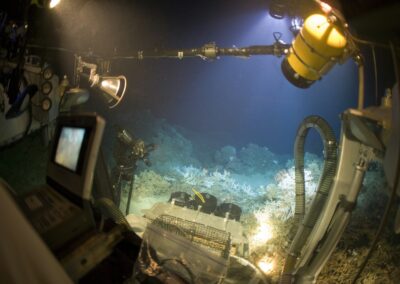The Role of AI in Environmental Sustainability
AI in environmental monitoring is revolutionizing the way we understand and address pollution challenges, particularly in regions like Saudi Arabia and the UAE where rapid urbanization and industrialization are putting pressure on natural ecosystems. Traditional methods of environmental monitoring often rely on manual data collection and analysis, which can be time-consuming and prone to errors. However, AI-powered systems can process vast amounts of data from various sources, including satellite imagery, sensor networks, and social media, to provide real-time insights into pollution levels and trends. By leveraging machine learning algorithms, these systems can detect patterns and anomalies that may indicate environmental hazards, enabling proactive intervention and policy decisions to protect public health and ecosystem integrity.
Predicting Pollution Levels with Precision
One of the key benefits of AI in environmental monitoring is its ability to predict pollution levels with remarkable accuracy. By analyzing historical data and environmental parameters such as air quality, water quality, and land use, AI models can forecast pollution levels in specific locations over time. In Riyadh and Dubai, where air pollution and water scarcity are pressing concerns, AI-driven predictive analytics can help authorities and businesses anticipate pollution hotspots and implement targeted mitigation strategies. Whether it’s reducing emissions from industrial facilities, optimizing waste management practices, or promoting renewable energy adoption, AI-powered predictions enable proactive measures to safeguard environmental quality and public health.
Proposing Mitigation Strategies for Sustainable Development
AI in environmental monitoring not only identifies pollution trends but also proposes mitigation strategies for sustainable development. By analyzing data on pollutant sources, transport mechanisms, and environmental impacts, AI systems can recommend interventions to minimize pollution and promote resource efficiency. In Saudi Arabia and the UAE, where governments are prioritizing sustainable development goals, AI-driven insights play a vital role in shaping environmental policies and investment decisions. From green infrastructure planning to smart transportation initiatives, AI-powered recommendations guide stakeholders towards environmentally responsible practices that balance economic growth with ecological preservation. By harnessing the power of AI, we can achieve a more sustainable and resilient future for generations to come.
Fostering Innovation and Collaboration for Environmental Solutions
The deployment of AI in environmental monitoring stimulates innovation and collaboration among diverse stakeholders, including government agencies, research institutions, and private sector companies. By sharing data, expertise, and resources, these stakeholders can develop integrated solutions that address complex environmental challenges holistically. In Saudi Arabia and the UAE, where environmental sustainability is a strategic priority, collaborative partnerships fueled by AI-driven insights drive forward-looking initiatives that promote resource conservation, biodiversity preservation, and climate resilience. Leadership and management skills are essential for fostering collaboration and driving transformative change towards a more sustainable future. Through effective communication and strategic partnerships, stakeholders can leverage AI technologies to develop innovative solutions that protect the environment while supporting economic growth and human well-being.
Unlocking the Potential of AI in Environmental Conservation
The adoption of AI in environmental conservation opens up new avenues for addressing pressing environmental issues and promoting sustainable development. By harnessing the power of AI-driven insights and technologies, governments, businesses, and communities can work together to achieve ambitious environmental goals and build a more resilient future. In Saudi Arabia and the UAE, where the preservation of natural resources is paramount, AI-based solutions offer a strategic advantage in monitoring and managing environmental health. From precision agriculture to habitat restoration, AI enables targeted interventions that maximize efficiency and minimize ecological impact. As we continue to advance AI capabilities and expand its applications in environmental conservation, we pave the way for a greener, more sustainable world for future generations.
#AI #EnvironmentalMonitoring #PollutionLevels #MitigationStrategies #Sustainability #SaudiArabia #UAE #Riyadh #Dubai #ChangeManagement #Innovation #Collaboration #ClimateResilience























